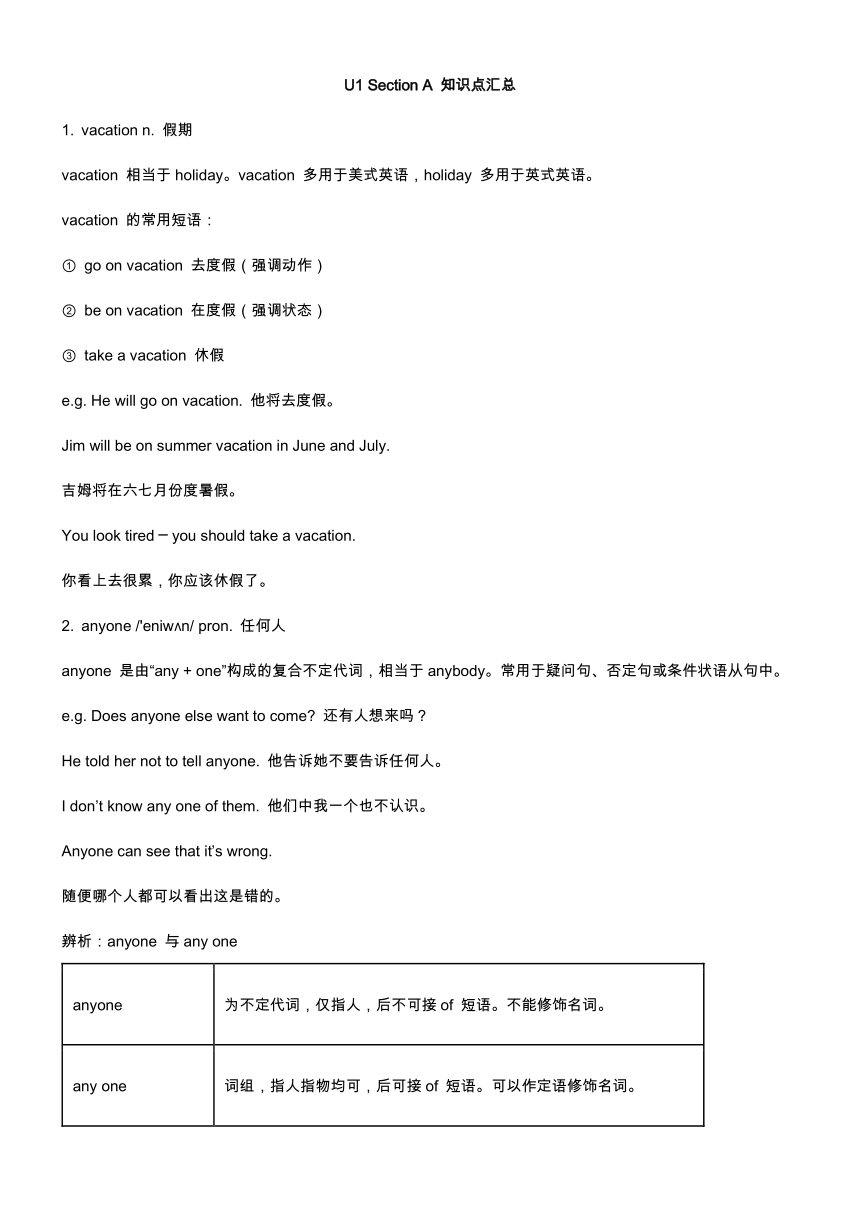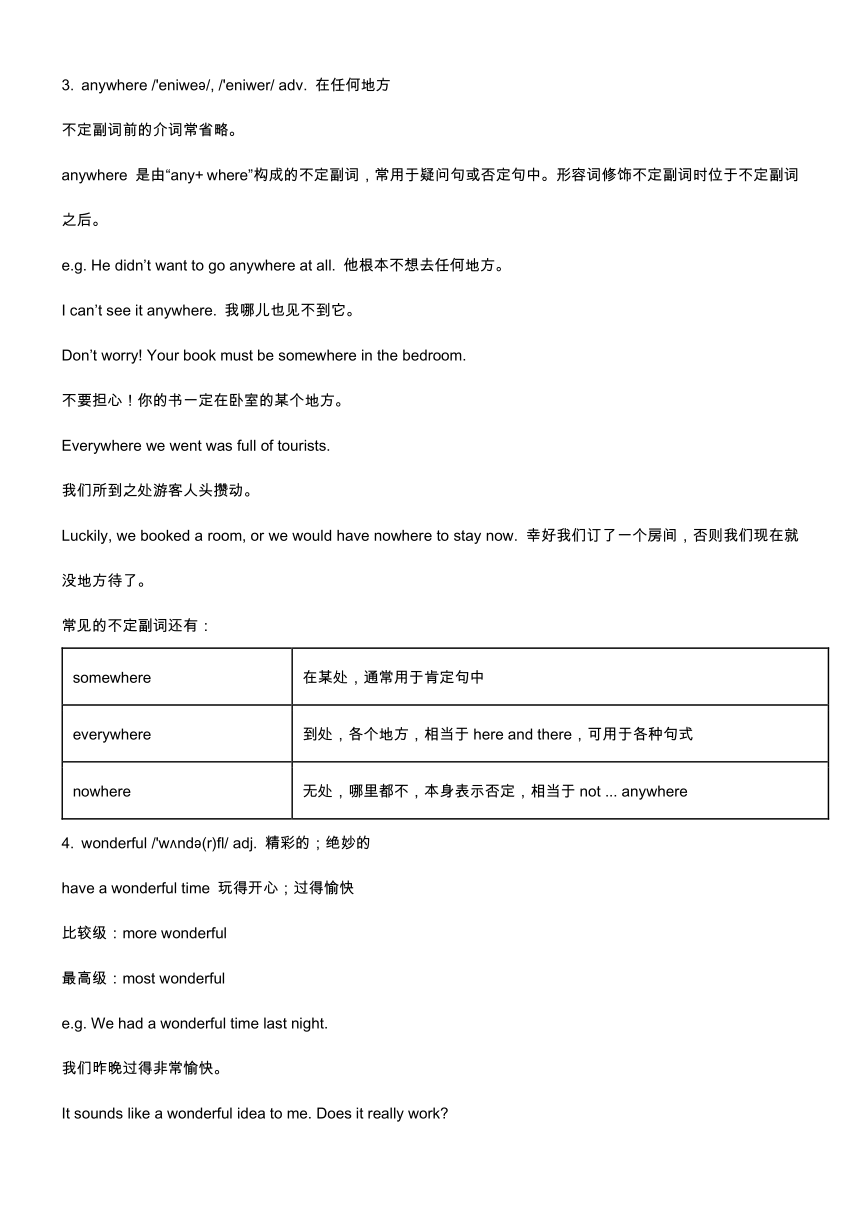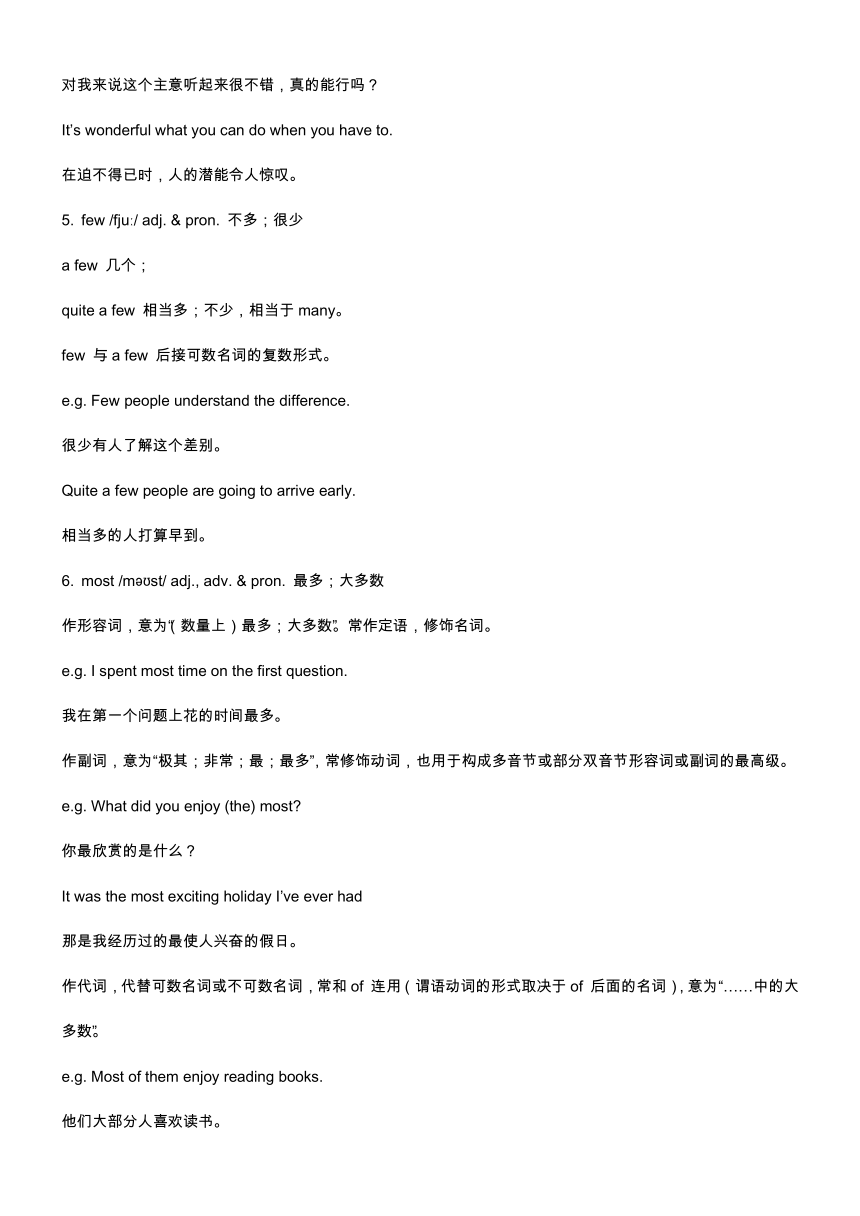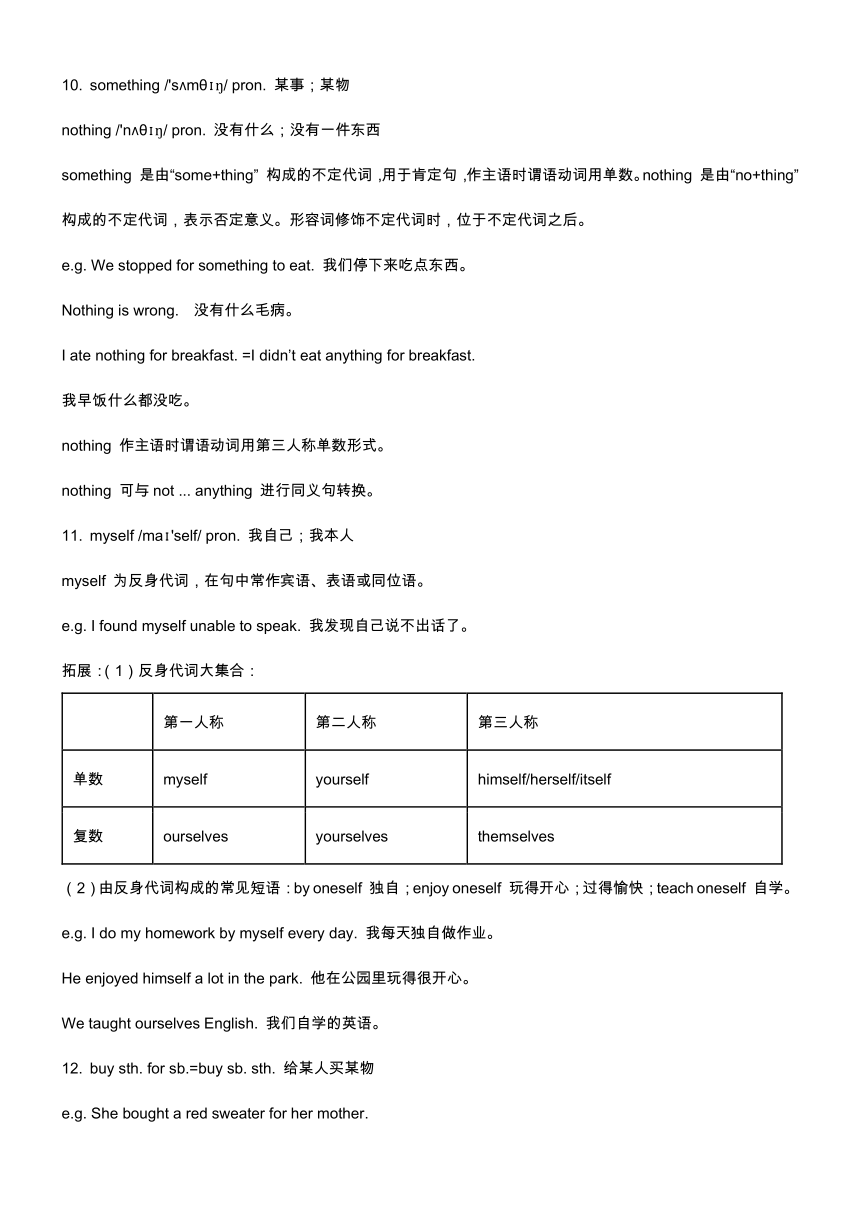nit 1 Where did you go on vacation?Section A 知识点汇总
文档属性
| 名称 | nit 1 Where did you go on vacation?Section A 知识点汇总 |  | |
| 格式 | docx | ||
| 文件大小 | 31.2KB | ||
| 资源类型 | 教案 | ||
| 版本资源 | 人教新目标(Go for it)版 | ||
| 科目 | 英语 | ||
| 更新时间 | 2023-07-24 09:32:59 | ||
图片预览





文档简介
U1 Section A 知识点汇总
1. vacation n. 假期
vacation 相当于holiday。vacation 多用于美式英语,holiday 多用于英式英语。
vacation 的常用短语:
① go on vacation 去度假(强调动作)
② be on vacation 在度假(强调状态)
③ take a vacation 休假
e.g. He will go on vacation. 他将去度假。
Jim will be on summer vacation in June and July.
吉姆将在六七月份度暑假。
You look tired ─ you should take a vacation.
你看上去很累,你应该休假了。
2. anyone /'eniw n/ pron. 任何人
anyone 是由“any + one”构成的复合不定代词,相当于anybody。常用于疑问句、否定句或条件状语从句中。
e.g. Does anyone else want to come 还有人想来吗?
He told her not to tell anyone. 他告诉她不要告诉任何人。
I don’t know any one of them. 他们中我一个也不认识。
Anyone can see that it’s wrong.
随便哪个人都可以看出这是错的。
辨析:anyone 与any one
anyone 为不定代词,仅指人,后不可接of 短语。不能修饰名词。
any one 词组,指人指物均可,后可接of 短语。可以作定语修饰名词。
3. anywhere /'eniwe /, /'eniwer/ adv. 在任何地方
不定副词前的介词常省略。
anywhere 是由“any+ where”构成的不定副词,常用于疑问句或否定句中。形容词修饰不定副词时位于不定副词之后。
e.g. He didn’t want to go anywhere at all. 他根本不想去任何地方。
I can’t see it anywhere. 我哪儿也见不到它。
Don’t worry! Your book must be somewhere in the bedroom.
不要担心!你的书一定在卧室的某个地方。
Everywhere we went was full of tourists.
我们所到之处游客人头攒动。
Luckily, we booked a room, or we would have nowhere to stay now. 幸好我们订了一个房间,否则我们现在就没地方待了。
常见的不定副词还有:
somewhere 在某处,通常用于肯定句中
everywhere 到处,各个地方,相当于here and there,可用于各种句式
nowhere 无处,哪里都不,本身表示否定,相当于not ... anywhere
4. wonderful /'w nd (r)fl/ adj. 精彩的;绝妙的
have a wonderful time 玩得开心;过得愉快
比较级:more wonderful
最高级:most wonderful
e.g. We had a wonderful time last night.
我们昨晚过得非常愉快。
It sounds like a wonderful idea to me. Does it really work
对我来说这个主意听起来很不错,真的能行吗?
It’s wonderful what you can do when you have to.
在迫不得已时,人的潜能令人惊叹。
5. few /fju / adj. & pron. 不多;很少
a few 几个;
quite a few 相当多;不少,相当于many。
few 与a few 后接可数名词的复数形式。
e.g. Few people understand the difference.
很少有人了解这个差别。
Quite a few people are going to arrive early.
相当多的人打算早到。
6. most /m st/ adj., adv. & pron. 最多;大多数
作形容词,意为“(数量上)最多;大多数”。常作定语,修饰名词。
e.g. I spent most time on the first question.
我在第一个问题上花的时间最多。
作副词,意为“极其;非常;最;最多”,常修饰动词,也用于构成多音节或部分双音节形容词或副词的最高级。
e.g. What did you enjoy (the) most
你最欣赏的是什么?
It was the most exciting holiday I’ve ever had
那是我经历过的最使人兴奋的假日。
作代词,代替可数名词或不可数名词,常和of 连用(谓语动词的形式取决于of 后面的名词),意为“……中的大多数”。
e.g. Most of them enjoy reading books.
他们大部分人喜欢读书。
Most of the food is fresh.
大部分食物新鲜。
most 是many 或much 的最高级。
e.g. It was the people with the least money who gave most generously. 最没钱的人最慷慨大方。
7. taste /te st/ v. 尝出;品尝;有……味道
taste 作系动词,后接形容词。taste like 尝起来像。
e.g. It tastes sweet. 这有甜味儿。
This drink tastes like sherry. 这种酒味道像雪利酒。
拓展:(1)taste 还可以作名词。意为“味道;滋味”。
e.g. The soup has very little taste. 这汤没什么味道。
(2)taste 对应的形容词为tasty,意为“美味的;可口的”。
e.g. The soup was tasty. 汤味道很好。
8. How do you like ... 你/ 你们觉得……怎么样?
e.g. —How do you like the book 你认为这本书怎么样?
—It’s wonderful. 很精彩。
“你觉得……怎么样?” 的表达:
① How do you like...
② What do you think of...
③ How do you feel about...
9. of course 当然;自然
e.g. —May I use your English book 我可以用你的英语书吗?
—Of course. 当然。
—Would you mind opening the window 你介意打开窗户吗?
—Of course not. 当然不。
10. something /'s mθ / pron. 某事;某物
nothing /'n θ / pron. 没有什么;没有一件东西
something 是由“some+thing” 构成的不定代词,用于肯定句,作主语时谓语动词用单数。nothing 是由“no+thing”构成的不定代词,表示否定意义。形容词修饰不定代词时,位于不定代词之后。
e.g. We stopped for something to eat. 我们停下来吃点东西。
Nothing is wrong. 没有什么毛病。
I ate nothing for breakfast. =I didn’t eat anything for breakfast.
我早饭什么都没吃。
nothing 作主语时谓语动词用第三人称单数形式。
nothing 可与not ... anything 进行同义句转换。
11. myself /ma 'self/ pron. 我自己;我本人
myself 为反身代词,在句中常作宾语、表语或同位语。
e.g. I found myself unable to speak. 我发现自己说不出话了。
拓展:(1)反身代词大集合:
第一人称 第二人称 第三人称
单数 myself yourself himself/herself/itself
复数 ourselves yourselves themselves
(2)由反身代词构成的常见短语:by oneself 独自;enjoy oneself 玩得开心;过得愉快;teach oneself 自学。
e.g. I do my homework by myself every day. 我每天独自做作业。
He enjoyed himself a lot in the park. 他在公园里玩得很开心。
We taught ourselves English. 我们自学的英语。
12. buy sth. for sb.=buy sb. sth. 给某人买某物
e.g. She bought a red sweater for her mother.
=She bought her mother a red sweater.
她给她的妈妈买了一件红毛衣。
13. There be nothing to do but... 除了……之外,没有什么事可做。
e.g. There was nothing to do yesterday but watch the news on TV because of the rain.
因为下雨,昨天除了在电视上看新闻外没有什么事可做。
He had nothing to say but to leave the room.
他没有什么可说的,只有离开房间。
易错提醒:
There be nothing to do but... 和Sb. have/ has nothing to do but... 具有相同的意思。在这两个结构中, 当but 前面有实义动词do 时,but 后面使用不带to 的动词不定式;没有实义动词do 时,要使用带to 的动词不定式。
14. seem /si m/ v. 似乎;好像;看来
seem seem to do sth. 好像做某事
seem(to be)+n./adj. 似乎……;好像……
It seems + that 从句/ as if 从句 似乎/好像……
seem like... 似乎像……
seem 一般不用于进行时态,也不用于被动语态。
e.g. You seem happy.=You seem to be happy. 你好像挺高兴。
He seems a nice man. 他看来是个好人。
It seems that they know what they’re doing.
=They seem to know what they’re doing.
看来,他们知道自己在干什么。
It seemed like a good idea at the time.
当时这主意好像不错。
15. bored /b (r)d/ adj. 厌倦的;烦闷的
bored 的主语常常是人。get bored 厌倦;be bored with 对······厌烦。
e.g. The children quickly got bored with staying indoors.
孩子们在屋子里很快就待不住了。
I was bored with what she said. 我对她说的话厌烦。
辨析:bored与boring
bored 厌倦的;烦闷的。作表语,用来描述人的感受。
boring 没趣的;令人厌倦的。作表语或定语,用来描述事物的特点。
16. 一般过去时
一般过去时 一般过去时使用的两种情况 表示过去某个时间发生的动作或存在的状态。
表示过去经常或反复发生的动作。
特征 句中含有表示过去的时间状语。
一般过去时 基本结构 肯定 主语+was/were+ 表语+ 其他.
主语+ 动词过去式+ 宾语+ 其他.
否定 主语+was not/were not+ 其他.
主语+ 情态动词+not+ 其他.
主语+didn’t+ 动词原形+ 其他.
一般疑问句 Was/Were/ 情态动词+ 主语+ 其他?
Did+ 主语+ 动词原形+ 其他?
特殊疑问句 在一般疑问句前加特殊疑问词
一般过去时 过去式的变化规则 规则变化 一般在词尾加-ed。
以-e 结尾的加-d。
以重读闭音节结尾的动词,如末尾只有一个辅音字母,先双写该辅音字母,再加-ed。
不规则变化
①. 一般过去时使用的两种情形
过去←—过去某时—— 现在—→ 将来
↓
过去的动作或状态
过去 ←———————现在 —→ 将来
↑
过去经常性或习惯性动作
②. 一般过去时通常含有表示过去的时间状语
(1) 介词+ 表示过去时间的年、月、日,如in 1983 等。
(2) yesterday 以及由yesterday构成的短语, 如yesterday morning/afternoon/evening,the day before yesterday 等。
(3) 带有ago 的短语,如three days ago,five years ago 等。
(4) last 构成的短语,如last week/year/month 等。
(5) 表示过去的单词或短语,如once,at that time,just now 等。
特别提醒
(1)若找不到明显的时间状语,则通过上下文判断。
(2)两个或两个以上动词用and 连接时,若前一个动词为过去式,后面的动词一般也要用其过去式。
③. e.g. I was in Beijing last month. 我上个月在北京。
④. e.g. He watched TV till late at night. 他看电视直到深夜。
⑤. e. g. He was not/wasn’t 17 years old last year.
去年他不是17 岁。
⑥. e.g. I could not watch TV in 2016. 在2016 年我不能看电视。
⑦. e.g. We didn’t go to the park yesterday.
昨天我们没去公园。
⑧. e.g. Was he short last year 去年他矮吗?
⑨. e.g. Did she stay at home yesterday
昨天她待在家里吗?
⑩. e.g. How did he go to Shanghai 他怎么去上海的?
动词过去式的规则变化与不规则变化
规则变化:
类别 构成方法 示例
一般情况 加-ed visit—visited;listen—listened
以e 结尾 加-d love—loved;arrive—arrived
类别 构成方法 示例
以“辅音字母+y”结尾 变y 为i,再加-ed study—studied; carry—carried
以重读闭音节结尾, 且末尾只有一个辅音字母 双写最后一个辅音字母, 再加-ed plan—planned; chat—chatted
不规则变化:
类别 示例
过去式与原形一致 let—let;cut—cut
中间元音变化 i—a swim—swam;drink—drank
i—o ride—rode;drive—drove
o—e grow—grew;know—knew
过去式以-aught 和-ought结尾 teach—taught;bring—brought
结尾的d 变为t lend—lent;spend—spent
含有双写字母的词,将双写改成单写,在词尾加t feel—felt;sleep—slept
17. 复合不定代词
复合不定代词 构成 some- 类:someone,somebody,something
any- 类:anyone,anybody,anything
every- 类:everyone,everybody,everything
no- 类:nobody,nothing
复合不定代词 定义 不指明代替任何特定名词或形容词的代词叫做不定代词
复合不定代词相当于名词,在句中可以作主语、宾语和表语,但不能作定语。
用法 some- 类不定代词常用于肯定句,any- 类不定代词常用于否定句或疑问句。但在表示请求、建议、反问等问句中,问话者希望得到肯定回答时,问句中常常用some- 类的不定代词。
复合不定代词 用法 复合不定代词被形容词、动词不定式修饰时,形容词和动词不定式要置于其后。
anyone,anything 也可以用在肯定句中,表示“任何人”“任何事”。
辨析no one,none 与nothing ④
①. e.g. Is everyone here today
今天大家都到了吗?(作主语)
I ate nothing for breakfast this morning.
今天早上我什么也没有吃。(作宾语)
That’s nothing. 没什么。(作表语)
②. e.g. Someone is waiting for you.
有人在等你。
He didn’t tell us anything.
他什么都没有告诉我们。
③. e.g. I really have something to do. 我确实有事情要做。
拓展:复合不定代词作主语时,谓语动词用单数。
④. 辨析no one, none 与 nothing
(1) no one 只能用于指人,不能与of 连用。作主语时,谓语动词只能用单数形式。可表示“没有人”,一般用来回答who 引导的特殊疑问句。
e.g. No one wants to go shopping. 没有人想去购物。
—Who stayed at home 谁待在家里?
—No one. 没人。
2) none 表示“没有一个”。既可指人,也可指物。其后可接of,“none of + 可数名词复数”作主语时谓语动词用单、复数皆可。可指数量上“一个也没有”,一般用来回答how many/much 引导的特殊疑问句。
e.g. None of these pens work/works. 这些钢笔没有一支能用。
— How many students are there in the classroom
教室里有多少学生?
—None. 一个也没有。
(3) nothing 只能用于指物,作主语时,谓语动词只能用单数形式。可用来回答what 引导的特殊疑问句。
e.g. —What is in the box 箱子里有什么?
—Nothing. 什么东西也没有。
1. vacation n. 假期
vacation 相当于holiday。vacation 多用于美式英语,holiday 多用于英式英语。
vacation 的常用短语:
① go on vacation 去度假(强调动作)
② be on vacation 在度假(强调状态)
③ take a vacation 休假
e.g. He will go on vacation. 他将去度假。
Jim will be on summer vacation in June and July.
吉姆将在六七月份度暑假。
You look tired ─ you should take a vacation.
你看上去很累,你应该休假了。
2. anyone /'eniw n/ pron. 任何人
anyone 是由“any + one”构成的复合不定代词,相当于anybody。常用于疑问句、否定句或条件状语从句中。
e.g. Does anyone else want to come 还有人想来吗?
He told her not to tell anyone. 他告诉她不要告诉任何人。
I don’t know any one of them. 他们中我一个也不认识。
Anyone can see that it’s wrong.
随便哪个人都可以看出这是错的。
辨析:anyone 与any one
anyone 为不定代词,仅指人,后不可接of 短语。不能修饰名词。
any one 词组,指人指物均可,后可接of 短语。可以作定语修饰名词。
3. anywhere /'eniwe /, /'eniwer/ adv. 在任何地方
不定副词前的介词常省略。
anywhere 是由“any+ where”构成的不定副词,常用于疑问句或否定句中。形容词修饰不定副词时位于不定副词之后。
e.g. He didn’t want to go anywhere at all. 他根本不想去任何地方。
I can’t see it anywhere. 我哪儿也见不到它。
Don’t worry! Your book must be somewhere in the bedroom.
不要担心!你的书一定在卧室的某个地方。
Everywhere we went was full of tourists.
我们所到之处游客人头攒动。
Luckily, we booked a room, or we would have nowhere to stay now. 幸好我们订了一个房间,否则我们现在就没地方待了。
常见的不定副词还有:
somewhere 在某处,通常用于肯定句中
everywhere 到处,各个地方,相当于here and there,可用于各种句式
nowhere 无处,哪里都不,本身表示否定,相当于not ... anywhere
4. wonderful /'w nd (r)fl/ adj. 精彩的;绝妙的
have a wonderful time 玩得开心;过得愉快
比较级:more wonderful
最高级:most wonderful
e.g. We had a wonderful time last night.
我们昨晚过得非常愉快。
It sounds like a wonderful idea to me. Does it really work
对我来说这个主意听起来很不错,真的能行吗?
It’s wonderful what you can do when you have to.
在迫不得已时,人的潜能令人惊叹。
5. few /fju / adj. & pron. 不多;很少
a few 几个;
quite a few 相当多;不少,相当于many。
few 与a few 后接可数名词的复数形式。
e.g. Few people understand the difference.
很少有人了解这个差别。
Quite a few people are going to arrive early.
相当多的人打算早到。
6. most /m st/ adj., adv. & pron. 最多;大多数
作形容词,意为“(数量上)最多;大多数”。常作定语,修饰名词。
e.g. I spent most time on the first question.
我在第一个问题上花的时间最多。
作副词,意为“极其;非常;最;最多”,常修饰动词,也用于构成多音节或部分双音节形容词或副词的最高级。
e.g. What did you enjoy (the) most
你最欣赏的是什么?
It was the most exciting holiday I’ve ever had
那是我经历过的最使人兴奋的假日。
作代词,代替可数名词或不可数名词,常和of 连用(谓语动词的形式取决于of 后面的名词),意为“……中的大多数”。
e.g. Most of them enjoy reading books.
他们大部分人喜欢读书。
Most of the food is fresh.
大部分食物新鲜。
most 是many 或much 的最高级。
e.g. It was the people with the least money who gave most generously. 最没钱的人最慷慨大方。
7. taste /te st/ v. 尝出;品尝;有……味道
taste 作系动词,后接形容词。taste like 尝起来像。
e.g. It tastes sweet. 这有甜味儿。
This drink tastes like sherry. 这种酒味道像雪利酒。
拓展:(1)taste 还可以作名词。意为“味道;滋味”。
e.g. The soup has very little taste. 这汤没什么味道。
(2)taste 对应的形容词为tasty,意为“美味的;可口的”。
e.g. The soup was tasty. 汤味道很好。
8. How do you like ... 你/ 你们觉得……怎么样?
e.g. —How do you like the book 你认为这本书怎么样?
—It’s wonderful. 很精彩。
“你觉得……怎么样?” 的表达:
① How do you like...
② What do you think of...
③ How do you feel about...
9. of course 当然;自然
e.g. —May I use your English book 我可以用你的英语书吗?
—Of course. 当然。
—Would you mind opening the window 你介意打开窗户吗?
—Of course not. 当然不。
10. something /'s mθ / pron. 某事;某物
nothing /'n θ / pron. 没有什么;没有一件东西
something 是由“some+thing” 构成的不定代词,用于肯定句,作主语时谓语动词用单数。nothing 是由“no+thing”构成的不定代词,表示否定意义。形容词修饰不定代词时,位于不定代词之后。
e.g. We stopped for something to eat. 我们停下来吃点东西。
Nothing is wrong. 没有什么毛病。
I ate nothing for breakfast. =I didn’t eat anything for breakfast.
我早饭什么都没吃。
nothing 作主语时谓语动词用第三人称单数形式。
nothing 可与not ... anything 进行同义句转换。
11. myself /ma 'self/ pron. 我自己;我本人
myself 为反身代词,在句中常作宾语、表语或同位语。
e.g. I found myself unable to speak. 我发现自己说不出话了。
拓展:(1)反身代词大集合:
第一人称 第二人称 第三人称
单数 myself yourself himself/herself/itself
复数 ourselves yourselves themselves
(2)由反身代词构成的常见短语:by oneself 独自;enjoy oneself 玩得开心;过得愉快;teach oneself 自学。
e.g. I do my homework by myself every day. 我每天独自做作业。
He enjoyed himself a lot in the park. 他在公园里玩得很开心。
We taught ourselves English. 我们自学的英语。
12. buy sth. for sb.=buy sb. sth. 给某人买某物
e.g. She bought a red sweater for her mother.
=She bought her mother a red sweater.
她给她的妈妈买了一件红毛衣。
13. There be nothing to do but... 除了……之外,没有什么事可做。
e.g. There was nothing to do yesterday but watch the news on TV because of the rain.
因为下雨,昨天除了在电视上看新闻外没有什么事可做。
He had nothing to say but to leave the room.
他没有什么可说的,只有离开房间。
易错提醒:
There be nothing to do but... 和Sb. have/ has nothing to do but... 具有相同的意思。在这两个结构中, 当but 前面有实义动词do 时,but 后面使用不带to 的动词不定式;没有实义动词do 时,要使用带to 的动词不定式。
14. seem /si m/ v. 似乎;好像;看来
seem seem to do sth. 好像做某事
seem(to be)+n./adj. 似乎……;好像……
It seems + that 从句/ as if 从句 似乎/好像……
seem like... 似乎像……
seem 一般不用于进行时态,也不用于被动语态。
e.g. You seem happy.=You seem to be happy. 你好像挺高兴。
He seems a nice man. 他看来是个好人。
It seems that they know what they’re doing.
=They seem to know what they’re doing.
看来,他们知道自己在干什么。
It seemed like a good idea at the time.
当时这主意好像不错。
15. bored /b (r)d/ adj. 厌倦的;烦闷的
bored 的主语常常是人。get bored 厌倦;be bored with 对······厌烦。
e.g. The children quickly got bored with staying indoors.
孩子们在屋子里很快就待不住了。
I was bored with what she said. 我对她说的话厌烦。
辨析:bored与boring
bored 厌倦的;烦闷的。作表语,用来描述人的感受。
boring 没趣的;令人厌倦的。作表语或定语,用来描述事物的特点。
16. 一般过去时
一般过去时 一般过去时使用的两种情况 表示过去某个时间发生的动作或存在的状态。
表示过去经常或反复发生的动作。
特征 句中含有表示过去的时间状语。
一般过去时 基本结构 肯定 主语+was/were+ 表语+ 其他.
主语+ 动词过去式+ 宾语+ 其他.
否定 主语+was not/were not+ 其他.
主语+ 情态动词+not+ 其他.
主语+didn’t+ 动词原形+ 其他.
一般疑问句 Was/Were/ 情态动词+ 主语+ 其他?
Did+ 主语+ 动词原形+ 其他?
特殊疑问句 在一般疑问句前加特殊疑问词
一般过去时 过去式的变化规则 规则变化 一般在词尾加-ed。
以-e 结尾的加-d。
以重读闭音节结尾的动词,如末尾只有一个辅音字母,先双写该辅音字母,再加-ed。
不规则变化
①. 一般过去时使用的两种情形
过去←—过去某时—— 现在—→ 将来
↓
过去的动作或状态
过去 ←———————现在 —→ 将来
↑
过去经常性或习惯性动作
②. 一般过去时通常含有表示过去的时间状语
(1) 介词+ 表示过去时间的年、月、日,如in 1983 等。
(2) yesterday 以及由yesterday构成的短语, 如yesterday morning/afternoon/evening,the day before yesterday 等。
(3) 带有ago 的短语,如three days ago,five years ago 等。
(4) last 构成的短语,如last week/year/month 等。
(5) 表示过去的单词或短语,如once,at that time,just now 等。
特别提醒
(1)若找不到明显的时间状语,则通过上下文判断。
(2)两个或两个以上动词用and 连接时,若前一个动词为过去式,后面的动词一般也要用其过去式。
③. e.g. I was in Beijing last month. 我上个月在北京。
④. e.g. He watched TV till late at night. 他看电视直到深夜。
⑤. e. g. He was not/wasn’t 17 years old last year.
去年他不是17 岁。
⑥. e.g. I could not watch TV in 2016. 在2016 年我不能看电视。
⑦. e.g. We didn’t go to the park yesterday.
昨天我们没去公园。
⑧. e.g. Was he short last year 去年他矮吗?
⑨. e.g. Did she stay at home yesterday
昨天她待在家里吗?
⑩. e.g. How did he go to Shanghai 他怎么去上海的?
动词过去式的规则变化与不规则变化
规则变化:
类别 构成方法 示例
一般情况 加-ed visit—visited;listen—listened
以e 结尾 加-d love—loved;arrive—arrived
类别 构成方法 示例
以“辅音字母+y”结尾 变y 为i,再加-ed study—studied; carry—carried
以重读闭音节结尾, 且末尾只有一个辅音字母 双写最后一个辅音字母, 再加-ed plan—planned; chat—chatted
不规则变化:
类别 示例
过去式与原形一致 let—let;cut—cut
中间元音变化 i—a swim—swam;drink—drank
i—o ride—rode;drive—drove
o—e grow—grew;know—knew
过去式以-aught 和-ought结尾 teach—taught;bring—brought
结尾的d 变为t lend—lent;spend—spent
含有双写字母的词,将双写改成单写,在词尾加t feel—felt;sleep—slept
17. 复合不定代词
复合不定代词 构成 some- 类:someone,somebody,something
any- 类:anyone,anybody,anything
every- 类:everyone,everybody,everything
no- 类:nobody,nothing
复合不定代词 定义 不指明代替任何特定名词或形容词的代词叫做不定代词
复合不定代词相当于名词,在句中可以作主语、宾语和表语,但不能作定语。
用法 some- 类不定代词常用于肯定句,any- 类不定代词常用于否定句或疑问句。但在表示请求、建议、反问等问句中,问话者希望得到肯定回答时,问句中常常用some- 类的不定代词。
复合不定代词 用法 复合不定代词被形容词、动词不定式修饰时,形容词和动词不定式要置于其后。
anyone,anything 也可以用在肯定句中,表示“任何人”“任何事”。
辨析no one,none 与nothing ④
①. e.g. Is everyone here today
今天大家都到了吗?(作主语)
I ate nothing for breakfast this morning.
今天早上我什么也没有吃。(作宾语)
That’s nothing. 没什么。(作表语)
②. e.g. Someone is waiting for you.
有人在等你。
He didn’t tell us anything.
他什么都没有告诉我们。
③. e.g. I really have something to do. 我确实有事情要做。
拓展:复合不定代词作主语时,谓语动词用单数。
④. 辨析no one, none 与 nothing
(1) no one 只能用于指人,不能与of 连用。作主语时,谓语动词只能用单数形式。可表示“没有人”,一般用来回答who 引导的特殊疑问句。
e.g. No one wants to go shopping. 没有人想去购物。
—Who stayed at home 谁待在家里?
—No one. 没人。
2) none 表示“没有一个”。既可指人,也可指物。其后可接of,“none of + 可数名词复数”作主语时谓语动词用单、复数皆可。可指数量上“一个也没有”,一般用来回答how many/much 引导的特殊疑问句。
e.g. None of these pens work/works. 这些钢笔没有一支能用。
— How many students are there in the classroom
教室里有多少学生?
—None. 一个也没有。
(3) nothing 只能用于指物,作主语时,谓语动词只能用单数形式。可用来回答what 引导的特殊疑问句。
e.g. —What is in the box 箱子里有什么?
—Nothing. 什么东西也没有。
同课章节目录
- Unit 1 Where did you go on vacation?
- Section A
- Section B
- Unit 2 How often do you exercise?
- Section A
- Section B
- Unit 3 I'm more outgoing than my sister.
- Section A
- Section B
- Unit 4 What's the best movie theater?
- Section A
- Section B
- Unit 5 Do you want to watch a game show?
- Section A
- Section B
- Unit 6 I'm going to study computer science.
- Section A
- Section B
- Unit 7 Will people have robots?
- Section A
- Section B
- Unit 8 How do you make a banana milk shake?
- Section A
- Section B
- Unit 9 Can you come to my party?
- Section A
- Section B
- Unit 10 If you go to the party, you'll have a grea
- Section A
- Section B
